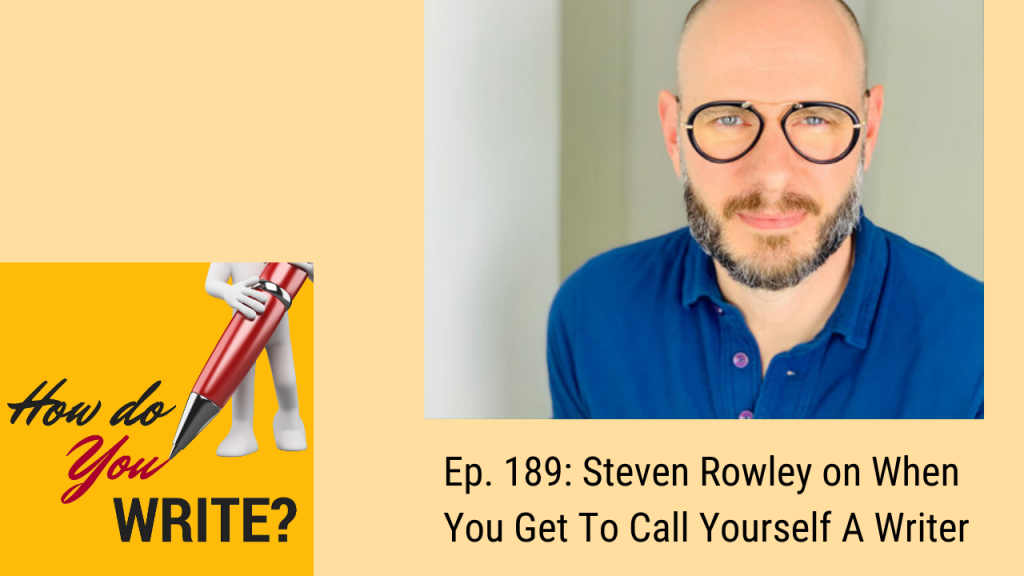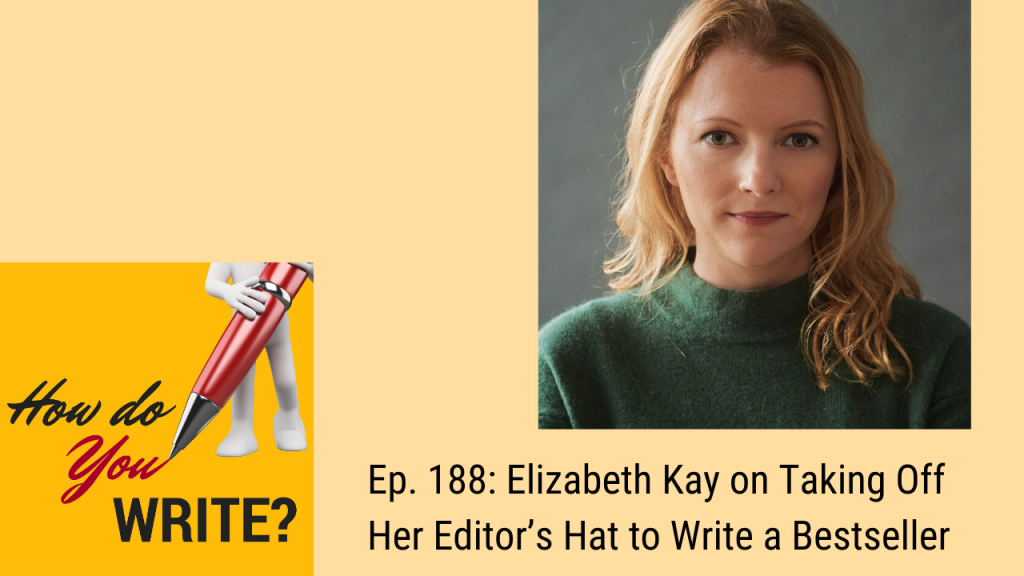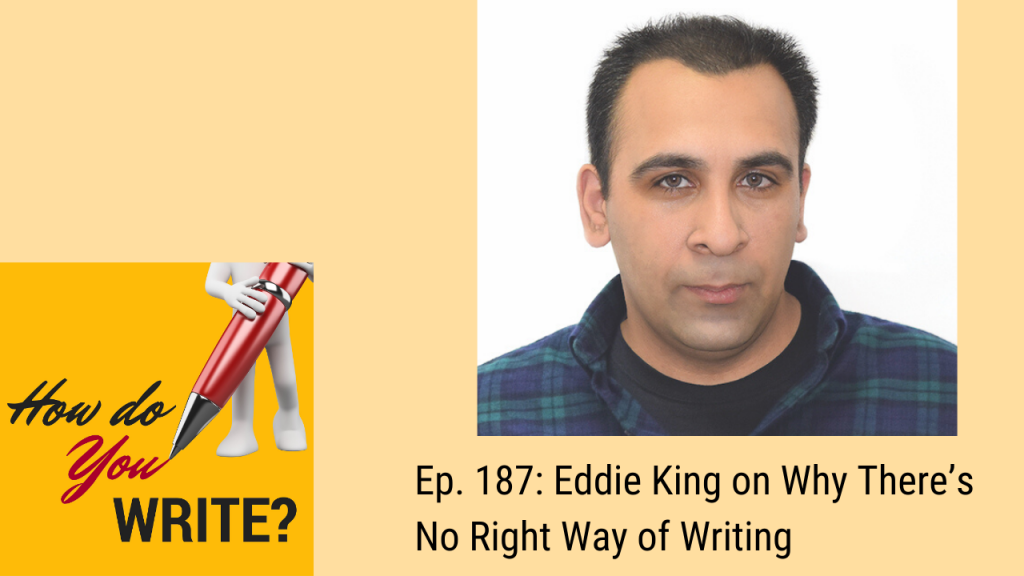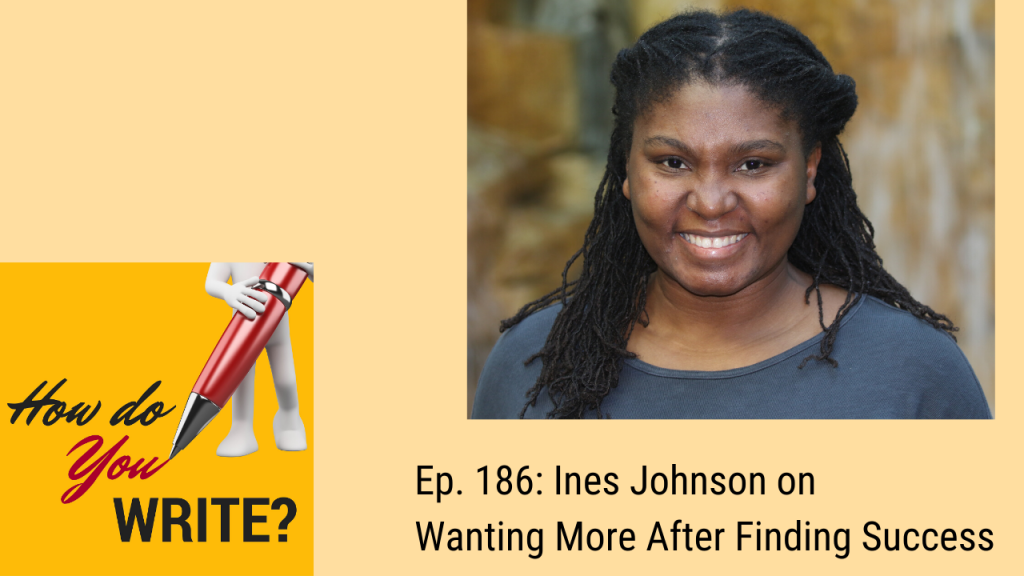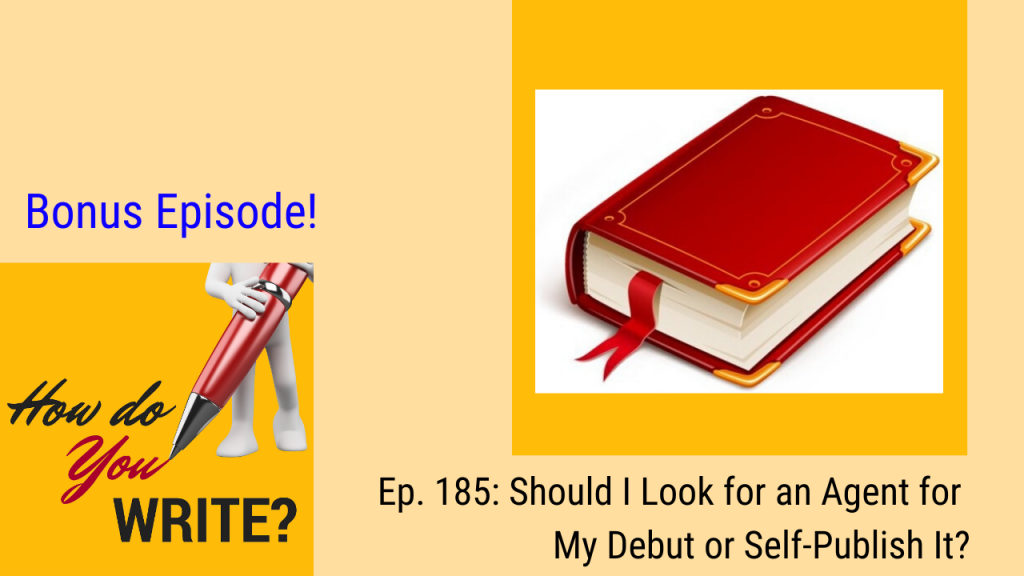Anthony Moore is an author, speaker, and one of the top 100 writers on the entire Medium.com platform. In the past 3 years, he’s gone from virtually zero readers, subscribers, and income to 45,000+ Medium followers, 75,000+ email subscribers, and a 6-figure writing business. His book What Extraordinary People Know: How To Cut the Busy B.S. and Live Your Kick-Ass Life (Sourcebooks) hit bookshelves in 2019, and his book Wealthy Writers: How To Go Viral, Get Followers, and Get Rich Writing has been read by hundreds of his writing students through his online courses and coaching.
How Do You Write Podcast: Explore the processes of working writers with bestselling author Rachael Herron. Want tips on how to write the book you long to finish? Here you’ll gain insight from other writers on how to get in the chair, tricks to stay in it, and inspiration to get your own words flowing.
Join Rachael’s Slack channel, Onward Writers!
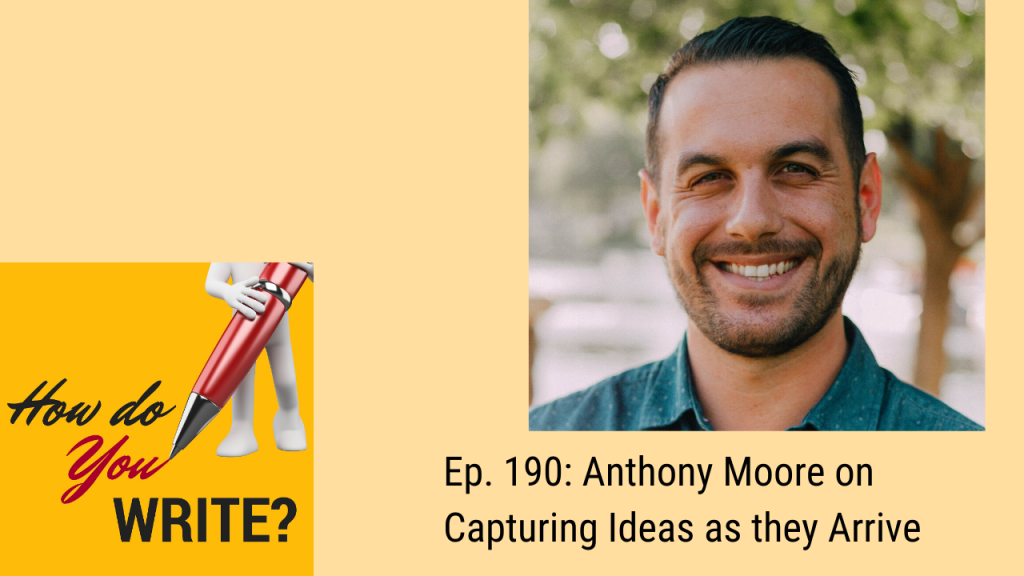
Transcript
Rachael Herron: [00:00:00] Welcome to “How do you Write?” I’m your host, Rachael Herron. On this podcast, I talk to authors about how they write, what their process is and how their lives fit together. I’ll keep each episode short so you can get back to writing.
[00:00:15] Well, Hello writers! Welcome to episode #190 of “How do you Write?” I’m Rachael Herron. Really glad that you’re here with me. Today we’re talking to Anthony Moore, who is, charming and sweet and has some great things to say about how to keep and capture the ideas you get. So many of us have these ideas, assault us wherever we are. No matter what we’re doing and we lose them. I know I do. And it was really great to talk to him. He has a business model that is not like everybody else’s and I know that you’re going to enjoy listening to this smart man. I’m a little slower and I usually am today, a little bit down speed. Possibly, I have been sick. I don’t know if it’s been COVID. I really don’t think it has been, because as basic, because I’m better in a way week. Right, I, the last time I talked to you was pretty much the last time I felt good. So I’ve had this for a week and exactly is the same thing I got in the beginning of March with, all of the symptoms of COVID, but none of them lasting very long. Thank God. Right? So, I don’t know what’s going on, but a week later I am up at my desk for the first time and we’re waiting for my test to come back. However, they said it can be up to 10 days to get the test back. So it’s still just waiting. [00:01:44] There’s a part of me that hopes it is COVID just so I can have this assurance that, yeah, no, I’ve had it twice and I’m one of the people that gets it lightly, perhaps. Perhaps this time. I know a lot of people have gotten it twice now. However, this disease is so awful and bad and scary, and I know it mutates and does crazy, awful different things to so many different people. I also don’t want that to be true. I would like to know if we can lift our total quarantine cause right now, we’re not even going to the store when, of course we’re not going to the store. We’re not doing anything. I am not even talking to neighbors out the window right now because I feel weird about it. So yes, we do that in my neighborhood. We do talk to neighbors out the window sometimes. But not right now. And if I don’t have COVID, then I just have bad flu or cold or something like that and I can go back to after well, socially distancing, going to the grocery store, doing things that I enjoy doing, going swimming. I have not gone swimming again in the Bay. I have not even taking a walk in the last week. I’ve just been sleeping like 20 hours a day. So, very glad to be back at the desk, not looking for sympathy, just kind of explaining why my affect is like this today. But today I had a great day, I’ve done 45 minute sessions in revision cause I’m behind. I three, I lost three work- no four work days because of this. And I’m on deadline again for this book, but it’s, you know, a lighter weight deadline, lighter weight revision. So that is okay. And you know what life happens and we can’t always write on the days that we need to, we can’t always write on the days that we want to. I was reminded over at the Writer’s Well of, by Stephanie Bond, who’s awesome. And who filled in for me this week on the Writer’s Well. So if you don’t listen to that podcast with me and J. Thorn, you may want to go check that out, but I was reminded by Stephanie of the serenity prayer that I made for writers a while ago, and it is secular, non-God related. It just opens with the generic, please, please grant me the serenity to accept it when I cannot write. The courage to write when I can, and the wisdom to know the difference. There are many times in my life where I think to myself, I can’t write today. And what, what it is, is, is I just really want to, you know, screw off and watch Netflix or work in the garden or whatever it is that I’m working on. That’s what I’m talking about, the courage to know when I can, the courage to know, you are just procrastinating right now, Rachael. You’re just being a big whiny baby. Sit your butt down in the chair and do some work. You’ll feel better. That’s where I need courage. I also really, really, really need to embrace the serenity that comes with understanding when I can’t do work, I really tried to work when I was sick and my wife just kept rolling her eyes and reminding me, look, you’re sick. You can’t, your brain is not working. I was barely able to speak English. Your brain is not working. You must rest. And I don’t know if any of you are like me, but when I am sick, I am convinced, and this is weird. I’m convinced I’m just being too big a baby, and that anybody else would push through the fever, push through the coughing and get to the desk and do the work. And I’m just a lazy loser slob. And that is an abusive brain pattern that I have. I have, you know, I’ve, I really do struggle with a lot of guilt. Which is dumb. It’s so dumb and I’m not even beating myself up when I say this. I’m saying this gently and lovingly. That kind of guilt is not useful. I am a good person who does good things who feels good about my life choices. I am harming the earth little as possible, except I do eat meat and there’s no reason for me to feel guilt. I have an awesome life, but guilt, guilt is the engine that keeps me trucking along. And I know that and when I am sick, there’s no need for guilt, Jesus Christ. So it’s good to have a wife who is wonderful and reminds me of that and tells me to go back to bed and, and quit being even bigger baby and it’s really good to feel better and be back at the desk. And if you are struggling with illness or if you are struggling with stress or trauma or chronic illness or depression or chronic depression, those are all things. There are days where, you know, in your gut that you have the courage to push past the procrastination and that’s all it is, it’s procrastination. You’re lying to yourself. You can get up and sit in the chair and do 45-minutes work. And then there are other days when you can’t on those days, I’m asking you to give yourself that pass, that I was finally able to give me self this week. That just says, yeah, I need to rest, resting is my job. Whenever I realized that resting is my job, oh my gosh, I rest my ass off. Tell me to do a job. I’ll do a job. And when you tell me resting is a job, I embrace it. But when I think of resting as being lazy, then I get guilty and all of that, you know, the whole cycle starts again. So, if you need to rest my friend rest, like it’s your job, but because it is, and, please do what you need to do right now in these really difficult times to take care of yourself. Please don’t get COVID, please. I hope that everyone listening to me right now is healthy and safe. And I wish those things for you. I also wish, and hope that you are getting your own writing done and that it is filling your soul. Even if you’re writing terrible crap that you absolutely do not believe in, nor do you believe that you are the person who should be telling the story. Those are all just lies that we all are fed by the, the group unconscious that says, no, you shouldn’t write this. Yes. I’m telling you, you should write this. You have to write this. It’s your job also and it’s wonderful and I’m really proud of you. So, reach out to me wherever you can find me on the internet. [00:08:05] Don’t reach out to me on texts cause my phone just broke. It’s just been one of those days. So, I am very glad to be in this chair. Very grateful for all of you who are listening and, and, and that’s all, that’s all I’m going to end this clumsily. Please enjoy Anthony Moore and we’ll talk soon. [00:08:24] Hey, you’re a writer. Did you know that I send out a free weekly email of writing encouragement? Go sign up for it at www.rachaelherron.com/write and you’ll also get my Stop Stalling and Write PDF with helpful tips you can use today to get some of your own writing done. Okay, now onto the interview.Rachael Herron: [00:08:42] All right, well, I could not be more pleased today to welcome to the show Anthony Moore. Hello, Anthony.
Anthony Moore: [00:08:47] Hello, how’s it going?
Rachael Herron: [00:08:48] It’s good to have you, let me give you a little introduction before we start. Anthony Moore is an author, speaker, and one of the top 100 writers on the entire Medium.com platform. In the past 3 years, he’s gone from virtually zero readers, subscribers, and income to 45,000+ Medium followers, 75,000+ email subscribers, and a 6-figure writing business. His book, What Extraordinary People Know: How To Cut the Busy B.S and Live Your Kick Ass Life (Sourcebooks) hit bookshelves in 2019, and his book Wealthy Writers: How To Go Viral, Get Followers, and Get Rich Writing has been read by hundreds of his writing students through his online courses and coaching. What brought you to all of this like that- so that was how many years ago did you do this in the past three years?
Anthony Moore: [00:09:32] Yeah, three years.
Rachael Herron: [00:09:33] What was the motivation behind doing this?
Anthony Moore: [00:09:46] Oh man. Well, Rachael, I’ve been wanting to write it for a long time. When I got to college, my construction business owner dad, wanted me to be an engineer or some kind of like, you know, working with, with, with my hands, like he did, but I took a creative writing class and I just fell in love and I was like, I have to be a writer. So I became an English major. I got all the laughs, people followed me, all those lists of like worst majors to get, you know, like anyone who’s an English major knows that. Right. But ever since I was in college, I wanted to be a writer. And so for several years, four or five years after college, I tried to be writer and I just basically failed at everything. I mean, I, I tried everything you were supposed to try. I had a blog, I was paying a lot of money for like hosting fees and like constantly redesigning my website for some reason, trying to guest posts and like figure out advertisements and like, nothing was working. I made like 40, 50 bucks total after like five years.
Rachael Herron: [00:10:28] Yeah. Yeah.
Anthony Moore: [00:10:30] So, the past three years, everything changed. And I really just changed my whole mindset on how I approach my business. And before basically I was just treating myself like a casual blogger who wrote every few weeks and didn’t really do much. But changed it until like looking at it as a business, like how can I treat myself as a professional top tier writer? Like what were like the top paid authors and speakers and coaches and writers doing? And I should do that. So, just really saw a huge growth in the past few years. So it’s been a long time dream. I tell my wife every day. I mean, I’m so thankful for this life. I mean, I, I used to work in telemarketing. I was doing all kinds of crazy odd jobs or horrible, always wanting to be writer. So I finally made it thank God. I’m so grateful.
Rachael Herron: [00:11:09] I have been a full time writer for four years now, and I am the same way. Grateful every single gosh, darn day that I get to do this kind of thing. So where does the actual writing, fit into your day. Talk, talk to me about your process of writing. Writing, kind of the new work or the revision of the work.
Anthony Moore: [00:11:27] Yeah, sure. So, like what you mentioned in my intro, thanks for that, I am a top writer on Medium.com, which if listeners don’t know what that is, this is a big writing hub. You can talk about all kinds of stuff, you know, politics, tech, social issues, whatever and I’ve kind of built my platform on medium. So I post two or three articles a week, and frankly, they’re only about maybe 1500 words, not that long, maybe 5, 10 minute reads and I’ve been doing that for several years now. And just the consistency, I think is the backbone of my writing period, you know, and
Rachael Herron: [00:12:00] And nowadays, people get paid to write on medium, right? If you get a certain number of readers, how does that work? Or certain number of blocks? Or?
Anthony Moore: [00:12:07] Yeah. They actually changed the algorithm a lot, which is a little frustrating, but yes, they do pay you based on how long people read your articles.
Rachael Herron: [00:12:16] Oh, how you try to get them through. Yeah
Anthony Moore: [00:12:07] So, it used to be flags, it used to be views. It’s just like the read ratio who reads the whole thing and you get paid based on that. So it’s a great platform if you’re looking to make money as a writer, they can pay you starting immediately.
Rachael Herron: [00:12:29] Yeah. Fascinating. Okay. So, and how do you get that done? Are you a first in the morning kind of guy or are you late in the evening writer?
Anthony Moore: [00:12:38] You know, I have spent a lot of time figuring this out because as writers, this is our bread and butter. Like, how do you write the best, right? And I’ve written when I had a 9-5 and I’ve written as a full time writer myself. And basically what I found Rachael, is that, different things work at different times for me, like I used to wake up at 5:00 AM every single day. My wife and I were teaching English abroad in South Korea, super crazy. It was like language barrier and food and culture. And it was so busy, but every single day I was writing at 5:00 AM. It was awesome. But then I moved back here and it’s like, Hey, I can sleep in. I don’t need to do that. So it’s like, whatever my life becomes it’s like I write around that. So now it’s like my whole basis of writing, Rachael, it was just writing a little bit every day, small progress every day. And that’s how I’ve written my, my two books, how I’ve made huge online courses. It’s like when I have these deadlines and like word counts of the day, that really stresses me out. I feel like I’m already falling behind if I’m not feeling that day, whatever. But if I can just write a little bit, all the time, eventually I looked down and it’s like, wow, I’ve written a book. I like, I’ve written a whole book. I’ve written five articles like this week, and they’re all really great. So it’s just small progress every day for me.
Rachael Herron: [00:13:47] Do you, any of your articles end up in your books? Do you kind of collate them in or are the books completely standalone from the articles?
Anthony Moore: [00:13:55] No, they actually pretty connected. And I studied a lot of like bestselling authors and figured out how to write, you know, and a lot of it is like my kind of like rise to where I am now, it’s like I work a lot, I had a couple of articles that really, really hit, like, you know, really, really big semi viral articles. And it’s like, that works. Let’s focus on writing this kind of concept and for like a book. And it just connects into the business of my writing. So any online courses I have, or coaching I offer, or other books I’m making it, it’s like everything is mentioning everything else. So it’s a big cohesive connection that really fits, across the board. You know.
Rachael Herron: [00:14:30] Yeah. That’s really smart. I write in five different genres. So I, I, I screwed the pooch on that one. That’s not what you want
Anthony Moore: [00:14:40] It’s hard to connect all to that
Rachael Herron: [00:14:42] to do. Yeah. Yeah, exactly. What is your biggest challenge when it comes to writing?
Anthony Moore: [00:14:44] Oh, that’s a good one. Good question. You know, I think as writers, I’ve stumbled on this, this writing style that worked, you know, it’s like short, clear, concise. If you read my writing, it’s like pretty brief blunt. It’s like lean meat, you know? and, and like that work and it’s like, I tried for years, I finally found something that works, but it’s challenging to break out of that once you establish yourself as this, this person and I work with a lot of new writers and like I have writing coaching and writing courses and they come to me asking like, oh my gosh, like, I’m so scared. I’m going to get rejected. We’re going to laugh at me. It’s not gonna work. And on the one hand, I want to tell these people, like you’re in a great place because like, and like most loving, caring way, I can say nobody’s reading yet.
Rachael Herron: [00:15:30] Yes
Anthony Moore: [00:15:31] So you can do whatever you want and I’m like,
Rachael Herron: [00:15:32] nobody’s waiting for you
Anthony Moore: [00:15:33] Yeah. Once you kind of establish yourself, it’s harder to break through a mold. Like, hey, you’re this personal growth guy who like, writes this way. Like, why are you branching out into like in fiction or like, whatever it is. So it’s challenging to adopt new styles, even write a new John Rose. Once I have established myself the way I am now.
Rachael Herron: [00:15:51] Do you want to write in fiction?
Anthony Moore: [00:15:56] Yes and no. You know, like I like write primarily nonfiction, which is great and actually I studied fiction so much. A lot of fiction techniques are in my nonfiction writing, like storytelling, the hero’s journey, a tone, like, like different ways to like structure the article in a nonfiction way. So down the road, yes. But again, it’s like, I have established myself here. It’s hard to break out in like other areas.
Rachael Herron: [00:16:17] Yeah, yeah. What is your biggest joy when it comes to writing?
Anthony Moore: [00:16:24] You know; I get pretty vulnerable in my writing. I talk about my history with addiction and my family issues.
Rachael Herron: [00:16:30] Hey, Hey, I’m a fellow addict here.
Anthony Moore: [00:16:32] Okay, great. It’s like, yeah, it was great to meet another person to talk through
Rachael Herron: [00:16:36] Recovering. Yeah
Anthony Moore: [00:16:40] I talk a lot about that. I mean, as a kid, I used to stutter and I got bullied and like all these things, I never let, you know, I used to hide in shame for years. Right, and now that I write about it, Rachael it’s crazy seeing how many people email me saying, Hey, I have the exact same thing. Like, what did you do? Like, Hey, I stutter her too. How do you fix that? Or like, Hey, I also have addict issues, like family issues, or I feel so helpless. Like I write about my deepest, darkest struggles. And it’s so rewarding to see people message me like out of nowhere, I’m like, Hey, I found this article. It really spoke to me like one of the best articles I’ve ever read, because it really cut to the core of what I’m feeling. How can I, how can we talk more? It’s like helping them in ways I want to be helped for so long. It’s just, it’s incredible.
Rachael Herron: [00:17:23] It is the best. It is the best. And I really believe that about the more, true we are, when we’re talking about our own shame, the more we connect with the reader. And I swear to God as a memoir writer, I thought I was tapped. And then I really discovered that I was an alcoholic and addict. And, and then there was, you know, it was an awful time to like get sober and do all that stuff. But in the back of my mind, I’m like, yes! More to write about, more to talk about. Yeah
Anthony Moore: [00:17:52] Yeah.
Rachael Herron: [00:17:53] Can you share a craft tip of any sort with us?
Anthony Moore: [00:17:57] Yeah. What I do is that once I’m in like the momentum of writing, ideas, just, just come to me, you know, and if you stop for even a little bit, it’s like the whole process kind of dies really quickly. I mean, I, I read Stephen King’s book on writing, I’m sure a lot of listeners have, and he mentioned something like he like stopped writing for two weeks. And it felt how much harder it was to start again, right? So the craft tip I have, is a, once, you’re writing a lot, which is a given, you should be writing all the time, right? Start writing down these ideas that come to you. And for me, I use an app called Evernote was just like one of those mini generic note taking apps, but like I’m walking the dog, I’m in the car, like I’m going to a stop light. This, this headline pops into my mind like this, this idea and I write it down. And I feel like if you don’t use it, you’re going to lose it. But the more that you like writing it down, it’s like the more things are unlocked. There’s this great kind of like an analogy by, I forgot who it was, it’s a kind of a crew name. It’s called “Idea Sex” And they’re saying like, if you can connect like business with like, you know, arts or like two totally different things, if you connect those, you can make crazy idea babies, like things you’d never consider, but you have to like be listening to these thoughts all the time. And eventually you’re going to make these connections automatically, passively as you’re hanging out in the shower, walk your dog because you’re always thinking kind of like opening up your mind to these things. So I say, write all the time and then write down what comes to mind, because the more you write down, the more it’s going to come to you.
Rachael Herron: [00:19:29] It’s, it’s such a thing that I always forget to do that. I always think when I’m walking the dog, that I’m going to save the idea and I’m going to have it when I get home. Not only do I not remember the idea when I get home, but I don’t remember that I had one,
Anthony Moore: [00:19:40] Yeah
Rachael Herron: [00:19:41] Not like I get back to the desk and struggle. It’s just, it’s just gone forever. Perfect.
Anthony Moore: [00:19:43] Yeah. I’m like walking the dog like learning how to type as Alicia’s like, oh my gosh, that’s like, hold on. I was like, write this down, you know, I’m good at that.
Rachael Herron: [00:19:50] That is good. Voice to text man hit that speaker, man.
Anthony Moore: [00:19:52] You’re right. That’s true.
Rachael Herron: [00:19:56] What thing in your life affect your writing in a surprising way?
Anthony Moore: [00:20:02] Well, you know, I mentioned my, my stories growing up. Before I was trying to be a writer, right. And I actually recall, I wrote this like dumb little article about like, you know, career stuff or something and somebody comment me, Rachael, they said nobody ever commented on my stuff, right? Cause I was like a no name writer. And so I’ll come and it’s like, wow, somebody commented. They wrote, this is the worst article I have ever read my entire life, like period. But that’s it, it crushed me, crushed me. Right. So horrible. And so for years, I’m, I basically made it my subconscious mission to never write anything that could elicit that reaction ever again. And so, Hey, like that happened. Nobody ever commented because nobody ever read any more because it was the most vanilla boring, junk,
Rachael Herron: [00:20:44] Exactly
Anthony Moore: [00:20:45] You know, non-controversial stuff. So
Rachael Herron: [00:20:47] You can’t make everybody like your stuff.
Anthony Moore: [00:20:49] Exactly. So, when I started writing, like kind of getting back to like these roots of like, Hey, I’m going to make a stand. I’m going to draw a line in the sand saying, Hey, this is what I believe. Here are my stories. Here’s my darkest deepest stuff. Like this is me being vulnerable. Using these things, I never talked about it. Never wanted to talk about like I made a point to hide. When I talk about these things that hugely affects my writing, because that’s what I can bring lots of fiction techniques into like, save myself up as the year’s journey, overcoming adversity, bringing different characters, of tones of voice, dialogue into nonfiction. And so that makes like, just to adds a whole other level on my nonfiction work and really just builds huge rapport with my audience and me who have gone through the same thing. So not hiding those dark stories, but you use them in a way to say, Hey, I’m not perfect. I struggled too, but here’s what I’ve done. And maybe you can benefit from this too. That’s just worked wonders of my work
Rachael Herron: [00:21:36] That’s the kind of creative nonfiction that I love reading the best is when we go into a moment of another person and get to inhabit that with you. Yeah, that’s awesome. What is the best book you’ve read recently?
Anthony Moore: [00:21:50] I read books all the time. I think that’s a huge technique for writers to just get out of your craft. One I just read was the autobiography of Malcolm X. A really intense with just right now with, with the current climate, I want to be more informed as a straight white guy. I’ve had the wind in my sails pretty much since I was born. So I just, just hearing just the side of like black America, especially back then, it was just so eye opening and that’s such a good technique for writers to, and anyone like writers to like were like, Hey, I’ve never considered this before. And like writing characters or just like writing truths and principles. So that was a great book. I also just read, Phil Knight’s autobiography called Shoe Dog. He was a founder of Nike, just again, two great autobiographies that were almost like novels they’re written so well, like you’re like reading for them. And like things happen. It’s like, like you never forget, it’s a true story. So two great autobiographies. I found great just input from reading autobiographies of famous people across the board. It’s just really helpful for me to understanding how people work.
Rachael Herron: [00:22:46] That’s fabulous. Thank you for those two. I haven’t read either of them and I’ve meant to read the Malcolm X forever and thank you for reminding me of it.
Anthony Moore: [00:22:51] Really good, great book
Rachael Herron: [00:22:52] Okay so now, where we can find you and everything that you are doing?
Anthony Moore: [00:22:57] Yeah. So basically two places first, is just my blog, AnthonyMoore.co all my stuff is there. And also just I made a free writing training. It’s focused on medium and like how to kind of make money from that.
Rachael Herron: [00:23:09] Excellent
Anthony Moore: [00:23:10] So if you go to freelance writer, starter package.com. It’s an hour long free training that talks about how I make my income streams, how to just write great articles. Freelance writers’ starter package.com, free training, check out how to write on media and kind of build-up this writer’s feels.
Rachael Herron: [00:23:22] Fabulous. I want to do that. I want to read that. So I’m going to go sign up for it right now. And I will put it in the show notes for everybody who wants to come by HowDoYouWrite.net and you can find it there.
Anthony Moore: [00:23:31] Perfect.
Rachael Herron: [00:23:32] It’s been a treat to talk to you, you are really, really
Anthony Moore: [00:23:35] It was great
Rachael Herron: [00:23:36] You tell your energy and how you are living your life, and you have achieved your wildest dreams.
Anthony Moore: [00:23:42] I am so grateful. Thank you. It’s great talking to you, Rachael.
Rachael Herron: [00:23:45] Awesome. Thank you.
Anthony Moore: [00:23:46] Thank you.
Rachael Herron: [00:23:47] Bye.
Thanks so much for joining me on this episode of “How do you Write?” You can reach me on Twitter, twitter.com/RachaelHerron, or at my website, www.rachaelherron.com, you can also support me on Patreon and get essays on living your creative life for as little as a buck an essay at www.patreon.com/rachael spelled R, A, C, H, A, E, L and do sign up for my free weekly newsletter of encouragement to writers rachaelherron.com/write/
Now, go to your desk and create your own process and get to writing my friends.
